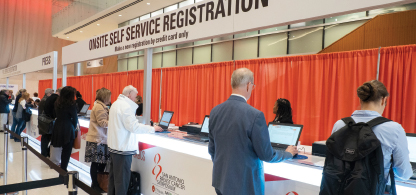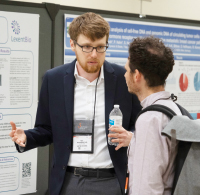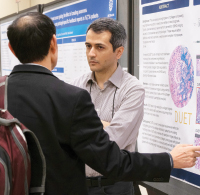
Jame Abraham, MD, FACP
More than 7,500 specialists in breast oncology from over 90 countries attended the 2019 San Antonio Breast Cancer Symposium (SABCS) held last December. Researchers convened to present a wide-ranging array of abstracts and posters featuring important new data in the treatment of breast cancer.
HER2-Positive Metastatic Breast Cancer
Among patients with progressing HER2-positive metastatic breast cancer previously treated with trastuzumab, pertuzumab, and ado-trastuzumab emtansine (T-DM1), 50% will develop brain metastases, and many will have a short duration of response to subsequent treatments. Tucatinib, an investigational, highly selective oral inhibitor of the HER2 tyrosine kinase, has the potential to meet this major unmet need by significantly reducing the risk of death and disease progression when added to trastuzumab/capecitabine.
In the international phase III HER2CLIMB study of 615 patients with progressive HER2-positive metastatic breast cancer,1 oral tucatinib, when added to trastuzumab/capecitabine, significantly improved both progression-free and overall survival. The results were presented by Rashmi K. Murthy, MD, of the University of Texas MD Anderson Cancer Center and concurrently published in The New England Journal of Medicine.2

More than 7,500 specialists in breast oncology from over 90 countries attended the 2019 San Antonio Breast Cancer Symposium. Photos by © MedMeetingImages/Todd Buchanan 2019.
The positive results of this trial represent significant progress. It’s the first evidence from a clinical trial of a targeted agent that can improve survival for patients with HER2-positive breast cancer that has metastasized to the brain.
On February 13, 2020, the U.S. Food and Drug Administration (FDA) granted priority review to tucatinib in combination with trastuzumab and capecitabine for HER2-positive breast cancer.
Novel Antibody-Drug Conjugate
Encouraging results in metastatic HER2-positive breast cancer were reported for the novel antibody-drug conjugate trastuzumab deruxtecan (T-DXd) in heavily pretreated patients in the phase II DESTINY-Breast 01 trial.3 The results were presented at SABCS by Ian E. Krop, MD, PhD, of Dana-Farber Cancer Institute and were published simultaneously in The New England Journal of Medicine.4
On December 20, 2019, the U.S. Food and Drug Administration (FDA) granted accelerated approval to T-DXd for patients with unresectable or metastatic HER2-positive breast cancer who have received two or more prior anti–HER2-based regimens in the metastatic setting.

The 2019 San Antonio Breast Cancer Symposium took place at the Henry B. Gonzalez Convention Center. Photo by © MedMeetingImages/Todd Buchanan 2019.
T-DXd is an antibody-drug conjugate with the same amino acid sequence as trastuzumab, linked to a payload of topoisomerase 1 inhibitor. With a much higher ratio of cytotoxic drug to antibody (8:1) than ado-trastuzumab emtansine (T-DM1), it is more potent against cancer cells, and its membrane permeability means that T-DXd can kill neighboring tumor cells regardless of HER2 expression. (T-DM1 is approved by the FDA in the adjuvant setting and offers an important treatment option for our patients with HER2-positive breast cancer.)
The data from DESTINY-Breast01 suggest the potential for a new standard of care in previously treated patients with HER2-positive advanced breast cancer. We eagerly await the results of the ongoing phase III DESTINY trials, which are looking at the role of T-DXd in the second-line setting in patients with HER2-positive breast cancer.
Failed ATEMPT With Adjuvant T-DM1 in Stage I Disease
The antibody-drug conjugate T-DM1 failed to show improved safety when compared with paclitaxel plus trastuzumab as adjuvant therapy in patients with stage I HER2-positive breast cancer in the phase III ATEMPT trial presented by Sara M. Tolaney, MD, MPH, of the Dana-Farber Cancer Institute.5

Photos by © MedMeetingImages/Todd Buchanan 2019.

Photos by © MedMeetingImages/Todd Buchanan 2019.

Photos by © MedMeetingImages/Todd Buchanan 2019.
Given the low event rate seen in this trial, T-DM1 may be considered an alternative treatment approach to paclitaxel/trastuzumab for select patients with stage 1 HER2-positive disease who are concerned about specific side effects and who understand the potential for T-DM1 toxicities. The rate of discontinuation of T-DM1 was high (17%), suggesting that low-grade toxicities may be impacting patients’ well-being. It would be good to see a study of a shorter duration of treatment with T-DM1 followed by trastuzumab.
Another concern, however, is the cost of 1 year of T-DM1, which is about twice that of paclitaxel/trastuzumab. This financial toxicity is an important factor for some patients when making treatment decisions. The selection of this agent in stage 1 disease should clearly be individualized based on patients’ circumstances and preferences.
Biosimilars in HER2-Positive Disease
Trastuzumab-dkst was approved as a biosimilar to trastuzumab for the treatment of patients with HER2-overexpressing breast or metastatic gastric or gastroesophageal junction adenocarcinoma on December 1, 2017.6,7 Just prior to this year’s SABCS, on December 2, 2019, trastuzumab-dkst was launched in the United States in a partnership between Mylan-Biocon Biologics. Long-term results of the landmark HERITAGE study including overall survival data at 36 months were presented at the 2019 ASCO Annual Meeting by Hope S. Rugo, MD, Professor of Medicine, at the University of California, San Francisco.
In a news release announcing the 2019 U.S. launch of the biosimilar trastuzumab, Dr. Rugo commented on the HERITAGE study, saying, “The concordant efficacy data across all three endpoints [objective response rate, progression-free survival, overall survival at 36 months] conclusively demonstrated that [trastuzumab-dkst] was similar to [reference trastuzumab]….”
Trastuzumab-dkst is approved as a biosimilar to U.S.-approved trastuzumab, not as an interchangeable product. Patients must be selected for therapy based on FDA-approved companion diagnostic for a trastuzumab product.
Based upon the FDA approval of biosimilar trastuzumab-dkst, the National Comprehensive Cancer Network (NCCN) added a footnote to the trastuzumab-containing systemic therapy options for HER2-positive breast cancer, indicating that an FDA-approved biosimilar is an appropriate substitute for trastuzumab. Clinicians should be aware of the difference in the dosing of biosimilars.
Biosimilar Efficacy and Safety in Real-World Setting
The introduction of biosimilars into cancer therapy has increased access for many expensive drugs like trastuzumab to many more patients, especially in low- and middle-income countries. Investigators from Brazil evaluated the efficacy and safety of adjuvant biosimilar trastuzumab in the treatment of HER2-positive breast cancer in a real-world setting and presented their findings at the 2019 SABCS.8,9

Poster session. Photo by © MedMeetingImages/Todd Buchanan 2019.
The national, multicenter, observational prospective, real-world study took place in a number of institutions in Brazil. Leandro Alves, MD, and Debora Gagliato, MD, of Libbs Pharmaceutical, São Paulo, and Hospital Beneficencia Portuguesa de São Paulo, respectively, and coinvestigators reported that high costs of biological drugs is a barrier to access in countries such as Brazil, and that the use of biosimilar trastuzumab could result in health-care savings with the same efficacy and safety as the reference trastuzumab.
Biosimilars have been widely used outside the United States for many years, especially in Europe and Asia. The HERITAGE study led by Dr. Rugo of trastuzumab-dkst and the subsequent FDA approval of this biosimilar has really expanded the options for patients with HER2-positive tumors, particularly in this value driven health-care environment.
As with trastuzumab, the most common expected adverse events with trastuzumab-dkst in the treatment of HER2-positive breast cancer include fever, chills, headache, infection, congestive heart failure, insomnia, cough, and rash. Trastuzumab-dkst has boxed warnings for cardiomyopathy, infusion reactions, pulmonary toxicity, and embryofetal toxicity and also carries warnings/precautions for exacerbation of chemotherapy-induced neutropenia, as with trastuzumab.
Triple-Negative Breast Cancer
The addition of pembrolizumab to neoadjuvant or adjuvant chemotherapy achieved higher rates of pathologic complete response compared with placebo in patients with triple-negative breast cancer in the phase III KEYNOTE-522 trial, presented at SABCS by Peter Schmid, MD, PhD.10 Dr. Schmid is with Barts Cancer Institute, Queen Mary University of London. The benefits of pembrolizumab were consistent across subgroups, with the greatest benefit observed in node-positive and stage IIIB disease.
Patients who achieve pathologic complete response after neoadjuvant or adjuvant therapy have an improved survival and low recurrence risk, especially those with aggressive subtypes such as triple-negative breast cancer. With standard approaches, pathologic complete response rates are around 40% to 55%, so there continues to be a significant need for new regimens that can further improve upon these rates and can increase long-term, event-free survival in triple-negative breast cancer. The KEYNOTE-522 results suggest that the addition of pembrolizumab may be able to achieve this. The results of this trial, therefore, have the potential to change practice.
Interestingly, PD-L1 status was not associated with a tumor response in these early cancers—which is different from what is seen in metastatic breast cancer subjected to checkpoint inhibition. The investigators have hypothesized that the tumor plasticity and the tumor biology dynamics in early disease are less reactive to immune therapy. The use of immunotherapy in early breast cancer is still evolving, and there are many unanswered questions.
On the following pages of this supplement to The ASCO Post, we provide summaries of these and other study highlights from SABCS.
—Jame Abraham, MD, FACP
Dr. Abraham is Professor of Medicine and Chairman of the Hematology and Medical Oncology Department of Taussig Cancer Institute, Cleveland Clinic.
DISCLOSURE: HER2CLIMB was supported by Seattle Genetics. The DESTINY-Breast01 trial was supported by Daiichi Sankyo and AstraZeneca. KEYNOTE-522 was sponsored by Merck Sharp & Dohme. The ATEMPT trial was funded by Genentech. Dr. Abraham has received institutional research funding from Pfizer and Seattle Genetics.
REFERENCES
1. Murthy RK, Loi S, Okines A, et al: Tucatinib vs placebo, both combined with capecitabine and trastuzumab, for patients with pretreated HER2-positive metastatic breast cancer with and without brain metastases. 2019 San Antonio Breast Cancer Symposium. Abstract GS1-01. Presented December 11, 2019.
2. Murthy RK, Loi S, Okines A, et al: Tucatinib, trastuzumab, and capecitabine for HER-2 positive metastatic breast cancer. N Engl J Med 382:597-609, 2020.
3. Krop IE, Saura C, Yamashita T, et al: [Fam-] trastuzumab deruxtecan in subjects with HER2-positive metastatic breast cancer previously treated with T-DM1: A phase II, multicenter, open-label study (DESTINY-Breast01). 2019 San Antonio Breast Cancer Symposium. Abstract GS1-03. Presented December 11, 2019.
4. Modi S, Saura C, Yamashita T, et al: Trastuzumab deruxtecan in previously treated HER2-positive breast cancer. N Engl J Med 382:610-621, 2020.
5. Tolaney SM, Trippa L, Barry W, et al: TBCRC 033: A randomized phase II study of adjuvant trastuzumab emtansine vs paclitaxel in combination with trastuzumab for stage 1 HER2-positive breast cancer (ATEMPT). 2019 San Antonio Breast Cancer Symposium. Abstract GS1-05. Presented December 11, 2019.
6. U.S. Food and Drug Administration: FDA approves Ogivri as a biosimilar to Herceptin. Available at www.fda.gov/Drugs/InformationOnDrugs/ApprovedDrugs/ucm587404.htm. Accessed December 21, 2017.
7. Ogivri (trastuzumab-dkst) for injection prescribing information, Mylan GmbH, December 2017. Available at www.accessdata.fda.gov/drugsatfda_docs/label/2017/761074s000lbl.pdf. Accessed December 21, 2017.
8. Orlandini LF, Pimentel FF, Carrara HH, et al: Adjuvant trastuzumab effectiveness in a cohort of HER2-positive breast cancer Brazilian patients treated in a public hospital: The impact in public health planning compared to clinical trial data. 2019 San Antonio Breast Cancer Symposium. Abstract P2-08-22. Presented December 12, 2019.
9. Alves L, Gagliato D, et al: A prospective real-world study to evaluate the efficacy and safety of adjuvant biosimilar trastuzumab in the treatment of HER2-positive breast cancer. 2019 San Antonio Breast Cancer Symposium. Abstract OT2—01-05. Presented December 12, 2019.
10. Schmid P, Park YH, Ferreira M, et al. KEYNOTE-522: Phase 3 study of neoadjuvant pembrolizumab + chemotherapy versus placebo + chemotherapy, followed by adjuvant pembrolizumab versus placebo for early triple-negative breast cancer: Pathologic complete response in key subgroups and by treatment exposure and residual cancer burden. 2019 San Antonio Breast Cancer Symposium. Abstract GS3-03. Presented December 12, 2019.

